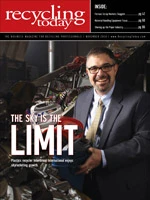The Department of Justice’s Inspector General has released a report that points out several previous shortcomings of Unicor’s electronics recycling services, most notably lax worker safety and environmental protections and insufficient knowledge of the destination of export shipments of electronic scrap. Some electronics recyclers and industry observers who have taken issue with Unicor in the past likely are finding validation in the report, titled “A Review of Federal Prison Industries’ Electronic-Waste Recycling Program.”
The report is available from the Department of Justice at www.justice.gov/oig/ reports/BOP/o1010.pdf and is based on investigations that began in 1997 and concluded in 2009.
“Our investigation found that prior to 2009 Unicor’s management of the e-waste recycling program resulted in numerous violations of health, safety and environmental laws, regulations and BOP (Federal Bureau of Prisons) policies,” the executive summary of the report notes.
The summary continues, “Our review determined that by 2009, with limited exceptions, Unicor’s e-waste operations (including CRT glass breaking activities) were compliant with OSHA (Occupational Safety & Health Administration) requirements and were being operated safely, though the agencies that assisted us recommended some additional improvements. Moreover, in 2009 Unicor also hired a new general manager of the Recycling Business Group with more than 30 years of work experience for the EPA (Environmental Protection Agency), Robert Tonetti, who has initiated changes that we believe will further improve health, safety and environmental practices.”
The report also notes that Unicor is pursuing Responsible Recycling (R2) certification for all seven of its facilities that process electronics. Unicor also holds ISO-9001:2008 certificates for quality systems certification for its Texarkana, Texas; Marianna, Fla.; Tucson, Ariz.; Atwater, Calif.; Lewisburg, Pa.; and Ft. Dix, N.J., locations, according to its website, www.unicor.gov/recycling/protect.cfm.
This report illustrates an uneven playing field that has persisted in the electronics recycling industry. While certification programs can offer some assurance to consumers of electronics recycling services and set a baseline for worker and environmental safety, backers of recent legislation proposed by Congressmen Gene Green and Mike Thompson that addresses electronic scrap exports say it is designed to provide more equanimity in the industry. The growing number of electronics recyclers who are obtaining certification in the form of e-Stewards and R2 can be considered encouraging, but many would argue that more needs to be done at the federal level.

Explore the November 2010 Issue
Check out more from this issue and find your next story to read.
Latest from Recycling Today
- Radius loses money, says merger on track
- Electrostatic technology vies for role in ASR sorting
- ReMA board to consider changes to residential dual-, single-stream MRF specifications
- Trump’s ‘liberation day’ results in retaliatory tariffs
- Commentary: Waste, CPG industries must lean into data to make sustainable packaging a reality
- DPI acquires Concept Plastics Co.
- Stadler develops second Republic Services Polymer Center
- Japanese scrap can feed its EAF sector, study finds






